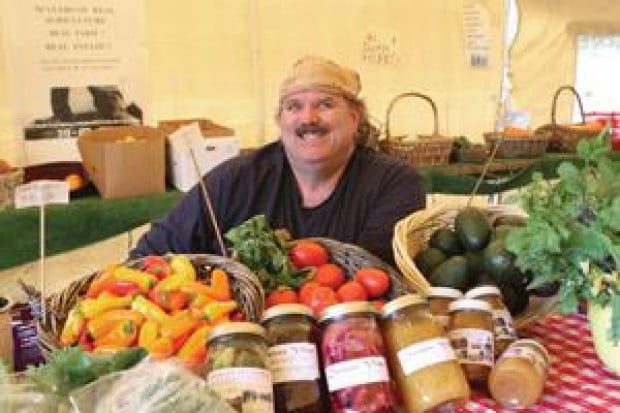
Local grower launches farm advisory committee.
By Melonie Magruder / Special to The Malibu Times
Local farmer Alan Cunningham, the proprietor of the 60-year-old Vital Zuman farm located on Pacific Coast Highway near Zuma Beach, has launched what he calls a Farm Advisory Committee in an attempt to develop a collective of local farmers.
Cunningham hopes this organic farming collective will provide a location where local farmers, or even residents with backyard plots of herbs or strawberries, can market their harvest, with everyone sharing the wealth.
The newly formed Farm Advisory Committee will meet Wednesdays each week to discuss organizational plans, farming issues, tips and methods to encourage citizen participation and to have a local, viable farmers’ market.
“Local organic produce is unquestionably the simplest and best food option,” Cunningham said in an interview with The Malibu Times. “It’s fresher and more flavorful, you don’t get the chemicals that come with commercially grown produce and you’re not contributing to pollution by buying stuff that’s been trucked hundreds if not thousands of miles.”
The Cornucopia Foundation experimented with running a local market earlier this decade, but the project never flourished due to problems with permitting, among other issues.
Mayor Pro Tem Sharon Barovsky, a friend and regular customer of Cunningham, said she supports the idea of a local farmers’ market.
“I know Alan has some of the best produce in town,” Barovsky said. “It is unfortunate that the Cornucopia Foundation could only operate on county property for its farmers’ market. But I think Alan’s headed in the right direction in forming a community task force to put one together.”
Barovsky said California law dictates that farmers’ markets must operate on “washable surfaces,” limiting locations for possible markets, and that the county did not renew Cornucopia’s lease to operate for various reasons. (Cornucopia Foundation members could not be reached for comment). Cunningham’s property provides such surfaces.
Proprietor of Terra restaurant, Chris Bocchino said he buys as much produce as possible from Cunningham for his restaurant.
“Malibu would absolutely support a farmers’ market,” Bocchino said. “I don’t know why there’s none available.”
Cunningham is forming alliances with groups like the Pepperdine Green Team, a student environmental organization, to spread the word about the collective, seek volunteers to work the farm in exchange for goods and to provide Malibu with a viable farmers’ market.
“Agriculture connects people in the most fundamental way,” Cunningham said. “In an urban center, people forget that seasons even exist! So, I am going to be holding seasonal festivals every year to bring the community together, encourage them to farm their own available land or plots here at Vital Zuman and, most important, to buy locally.”
Cunningham envisions the collective almost as a model of socialist industrial organization. He’s willing to barter-a quart of his rich, raw honey for a bushel of homegrown organic herbs, say, or the use of a sizeable plot of composted earth for a percentage of your harvest.
“I’ve maintained this farm through my own efforts so far,” Cunningham said. “If more people would help by either volunteering their time (in exchange for produce) or by simply buying a box of food every week, we could have a sustainable, local market that serves the community.”
Cunningham was born and raised in Malibu. His parents farmed Vital Zuman’s six acres since the 1950s, with groves of fig and orange trees and rows of greens facing the bracing sea air across from Zuma Beach.
Over the years, he learned appropriate crop rotation (spinach, lettuces, arugula and root vegetables in the winter; melons, cucumber and stone fruits next summer) and dabbled in bee husbandry. He wants to see Vital Zuman become a true collective farm and a community resource.
Cunningham didn’t always play gentleman farmer. He studied history at UCLA, but said now he views history in an agricultural context.
“Until 50 years ago or so, we’ve been an agricultural society,” he said. “Technology has changed that. But in farming, there are no rules. It’s all about you, some seeds and the weather.”
Farm volunteer Connie Russo said, “Maybe it sounds like communism, but I think everyone’s working hour should trade for an hour of something else. An hour of working on the farm is worth an hour of plumbing work, paid for by farm produce. It goes back to our pioneer roots.”
Last week, Emily Rose Reeder of the Pepperdine Green Team brought a student crew to walk the fields and talk farming.
“Our core team has about 23 members and 115 interested students,” Reeder said. “We want to take on green issues and help Malibu to plant gardens.”
Suggestions for the collective from the Green Team included arranging for local school classes to use the farm to learn how to grow their own food.
Cunningham is grateful for the team’s enthusiasm.
“I need a younger generation to come and help work the fields,” he said. “We’ll hold solstice festivals or equinox festivals and have music, speakers, planting projects and walkabouts. If locals get involved with production of their own food, the whole community benefits. An abundance of agriculture means an abundance for society.”
More information on Vital Zuman’s Farming Advisory Committee and collective farm can be obtained by calling 310.924.2210 or 310.457.4356 or by e-mailing vitalzuman@earthlink.net
